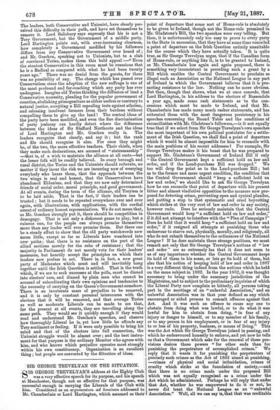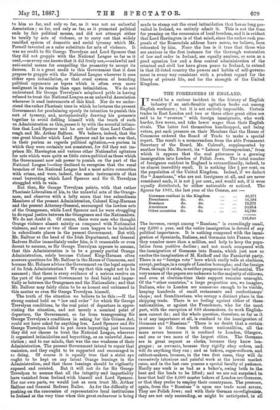SIR GEORGE TREVELYAN ON THE SITUATION.
SIR GEORGE TREVELYAN'S address at the Eighty Club IJ was a very effective speech for its purpose, and his speech at Manchester, though not so effective for that purpose, was successful enough in carrying the Liberals of the Club with him. Considered as an argumentum ad hominem addressed to Mr. Chamberlain or Lord Harlington, which assumed as their point bf departure that some sort of ' Home-rule is absolutely to be given to Ireland, though not the Home-rule promised. in Mr. Gladstone'd-Bill, the two speeches were very telling. Rut then, it is unfortunately only too easy to prove to every party in the State in succession, that they have at some time conceded a point of departure on the Irish Question entirely unsuitable for the course which they have actually taken. It is quite true, as Sir George Trevelyan urges, that if the Canadian form of Home-rule, or anything like'it, is to be granted to Ireland, as Mr. Chamberlain has again and again proposed, there is something very inconsistent in preceding such a grant by a Bill which enables the Central Government to proclaim as illegal such an Association as the National League in any part of Ireland in which the Government believes that it is pro- moting resistance to the law. Nothing can be more obvious. But then, though that shows, what we at once concede, that Lord Harlington, in his address to the electors of Rossendale a year ago, made some rash statements as to the con- cessions which must be made to Ireland, and that Mr. Chamberlain has made many much rasher statements, and has reiterated them with the most dangerous persistency in his speeches concerning the Round Table and the conditions of reconciliation with Mr. Gladstone's followers,—is it not equally true that if we select from Sir George Trevelyan's own speeches the most important of his own political postulates for a settle- ment of the Irish Question, we shall find a point of departure whioh it would be almost impossible for him to reconcile with the main positions of his recent addresses ? For example, Sir George Trevelyan makes it his boast that he was prepared to support Mr. Gladstone's Government of Ireland Bill if only " the Central Government kept a sufficient hold on law and order, and if the Land-purchase Bill was dropped." We too will drop the point as to the Land-purchase Bill ; but as to the former and more urgent condition, the condition that the Central Government should "keep a sufficiebt hold an law and order," we should like to ask Sir George Trevelyan how he can reconcile that point of departure with his present bitter and almost vindictive opposition to the measure now pro- posed for detecting crime, preventing open and cynical plunder, and putting a stop to that systematic and cruel boycotting which strikes at the very root of law and order in any society, however rude. Does he seriously maintain that the Central Government would keep "a sufficient hold on law and order," if it did not attempt to interfere with the "Plan of Campaign I" Does he hold that it would keep " a sufficient hold on law and order," if it resigned all attempts at punishing those who endeavour to starve out, physically, morally, and religiously, all who do not submit themselves to the ordinances of the National League 1' If he does maintain these strange positions, we most remark not only that Sir George Trevelyan's notions of "law and order " are so extremely lax that it does not seem to us of any importance whether the Central Government keeps its hold of them in his sense, or lets go its hold of them, but also that his notion of keeping hold of law and order in 1887 is a very different thing indeed from the notions which he held on the same subject in 1882. In the year 1882, it was thought necessary to bring under the summary jurisdiction of the Magistrates, and to subject to the preliminary inquiries of which the Liberal Party now complain so bitterly, all persons taking part in the meetings of an "unlawful Association," and an unlawful Association was in that year defined as any which encouraged or aided persona to commit offences against that Act. And it was such an offence to cause any one to abstain from doing what was lawful, or to do what it was lawful for him to abstain from doing, " in fear of any injury or danger to himself, or to any member of his family, or to any person in his employment, or in fear of any injury to or loss of his property, business, or means of living." This was the Act which Sir George Trevelyan joined. in passing, and which he endeavoured honestly to enforce, and yet now he tells us that a Government which asks for the renewal of these pro- visions desires those powers " for other ends than for punishing the perpetrators of accomplished crimes." We reply that it wants it for punishing the perpetrators of precisely such crimes as the. Act of 1882 aimed at punishing, —crimes of physical and social intimidation, crimes of cruelty which strike at the foundation of society,—and that there is no crime made under the proposed Bill which was not equally recognised as a crime under the Act which he administered. Perhaps he will reply that under that Act, whether he was empowered to do it or not,' he never did treat the National League as an "-unlawful Association," Well, all we can say is, that that was creditable to him so far, and only so far, as it was not an unlawful Association ; so far, and only so far, as it promoted political ends by fair political means, and did not attempt either to terrify by acts of violence, or to carry out that widely ramified system of domestic and social tyranny which Mr. Parnell invented as a safer substitute for acts of violence. It was no credit to Sir George Trevelyan and Lord Spencer that they did not grapple with the National League so far as it used,—as every one knows that it did freely use,—unlawful and anti-social means for compelling the peasantry to accept its decrees. It is a great credit to this Government that it does propose to grapple with the National League wherever it uses either open intimidation, or that cruel system of branding political opponents as lepers which is often even more malignant in its results than open intimidation. We do not understand Sir George Trevelyan's misplaced pride in having refused to treat the National League as an unlawful Association wherever it used instruments of this kind. Nor do we under- stand the rather Pharisaic tone in which he lectures the present Government for proclaiming openly its intention to punish this sort of tyranny, and, metaphorically drawing his garments together to avoid defiling himself with the touch of such an Administration as this, passes it by with the scornful intima- tion that Lord. Spencer and he are holier than Lord Castle- reagh and Mr. Arthur Balfour. We believe, indeed, that the one great blunder which Lord Spencer and he made was that, in their purism as regards political agitation,—a purism in which they were certainly not consistent, for did they not im- prison Mr. Harrington and various other Nationalist agitators for acts which were quite aa little extra-political asthma which the Government now ask power to punish on the part of the National League 1—they declined to recognise that the rural branches of the. National League had a most active connection with crime, and were, indeed, the main instruments of that cruel boycotting, which Lord Spencer and Sir G. Trevelyan struggled with in vain..
But then, Sir George Trevelyan points, with that rather Pharisaic Liberalism of his, to the unlawful acts of the Orange- men, and observes with a lofty scorn that two subordinate M,embers of the present Administration, Colonel King.Harman and the present Attorney-General, encouraged the lawless acts of the Orangemen, while Lord Spencer and Jae were struggling to do equal justice between the. Orangemen and the Nationalists. We do not doubt it. Of course, there were men who thought Orange violence almost saintly as compared with Nationalist violence, and one or two of these men happen to be included in subordinate places in the present Government. But with Mr. Balfour at the head of the Irish Department, and General Redvers Buller immediately under him, is it reasonable or even decent to assume, as Sir George Trevelyan appears to assume, that this Administration is to be a grossly partial Orange Administration, solely because Colonel King-Harman often answers questions for Mr. Balfour in the House of Commons, and because Mr. Holmes advises the Government on the legal aspects of its Irish Administration ? We say that this ought not to be assumed ; that there is every evidence of a serious resolve on the part of the present Government to deal fairly and impar- tially as between the Orangemen and the Nationalists ; and that Mr. Balfour may fairly claim to be as honest and unbiassed in this matter as even Sir George Trevelyan himself.
The truth of the situation we believe to be this :—If the strong central hold on "law and order" for which Sir George Trevelyan conditions, be the real point of departure in appre- ciating the situation, and not merely a nominal point of departure, the Government, so far from transgressing Sir George Trevelyan'e conditions in asking for this Crimes Act, could not have asked for anything lees. Lord Spencer and Sir George Trevelyan failed to put down, boycotting just because they did not choose to treat the National League, wherever it organised intimidation and boycotting, as an unlawful Asso- ciation ; and to our minds, that was the one weakness of their
Administration. The present Government intend to repair that omission, and they ought to be supported and encouraged in so doing. Of coarse it is equally true that a strict eye ought to be kept on any latent Orange leanings in the Administration, and that those leanings should be vigilantly esposed and resisted. But it will not do for Sir George
Trevelyan, to assume that all the integrity and impartiality have vanished from Ireland with himself and Lord Spencer.
For our own party, we would just, as soon trust Mr. Arthur Pedfour and General Redvers Buller. As for the difficulty of Rushing on the concession of representative local institutions to Ireland at the very time when this great, endeavour is being
made to stamp out the cruel intimidation that has so long pre- veiled in Ireland, we entirely admit it. This is not the time for pressing on the concession of local freedom, and it is evident that Lord Hartington is of that mind, since the rather rash pro, posals of the Ressendale address have never, we believe, been reiterated by him. None the less is it true that those who are anxious in the first instance for the thorough restoration of law and order in Ireland, are equally anxious, so soon as a good agrarian law and a firm central administration of the criminal and civil law have given peace to Ireland, to extend in that ill-fated country the powers and habits of self-governe went in every way consistent with a. prudent regard for the liberty of private life, and for the strength of the United, Kingdom.



















































 Previous page
Previous page